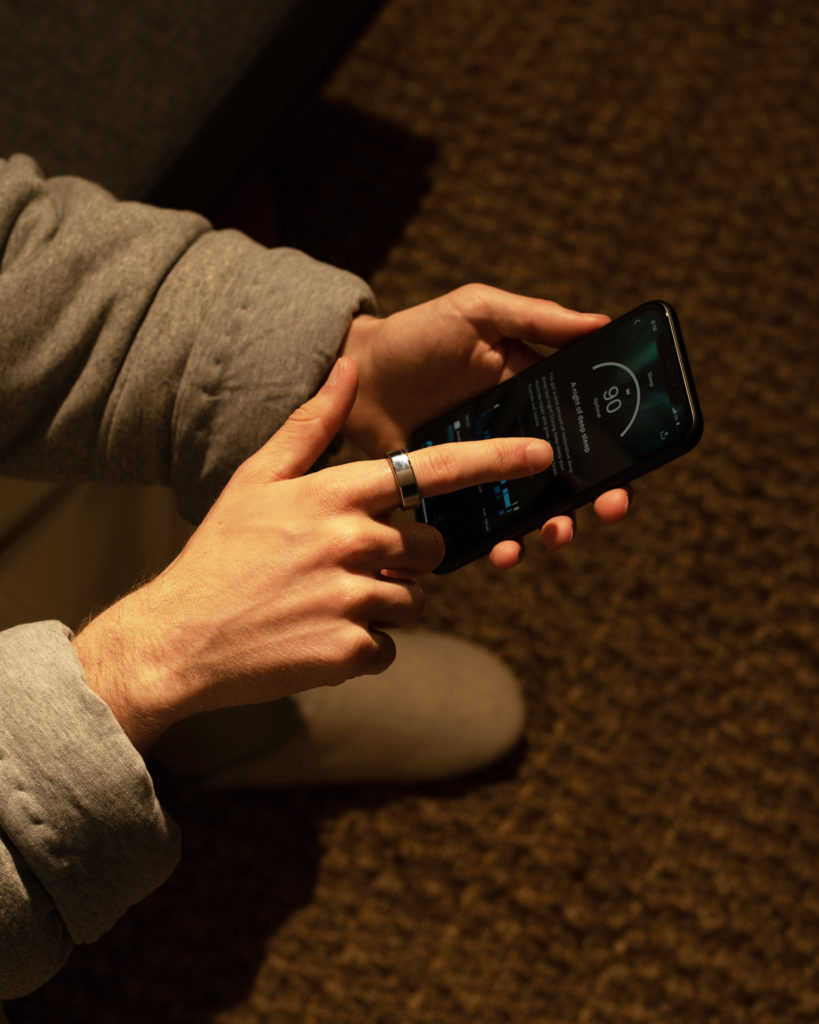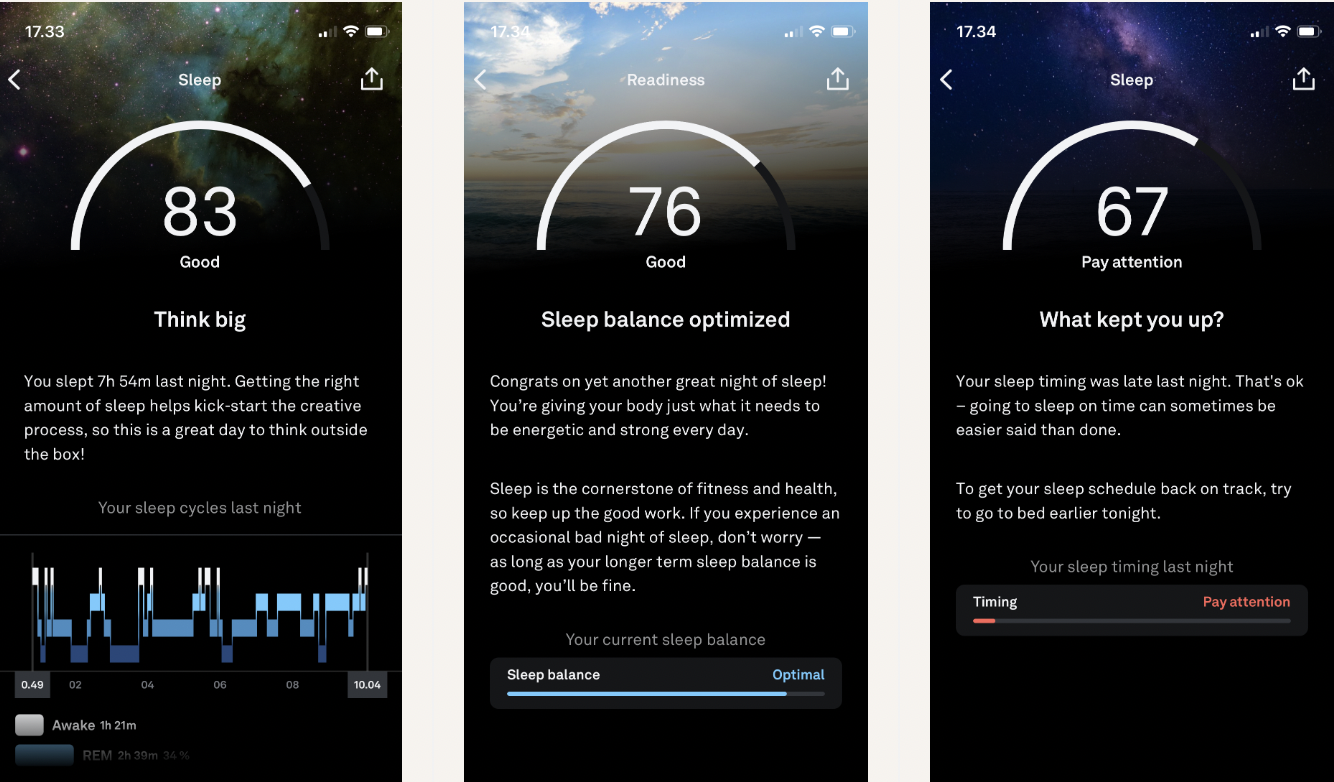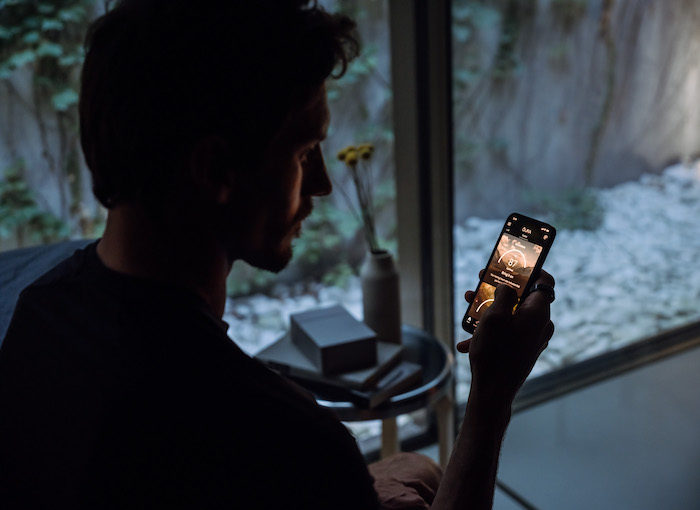A multitude of metrics at your fingertips clueing you into how restful (or restless) your shuteye was can be eye-opening, but it can also lead to worry. In fact, sleep researchers have coined a term—orthosomnia—to describe a preoccupation with “perfect” sleep.
However, good sleep is essential to good health. So how can you use a health wearable like Oura Ring to support healthy habits—without becoming obsessed? Read on to understand orthosomnia and discover strategies for a more balanced, self-compassionate approach to sleep.
More Data, More Stress?
Thanks to advancements in technology, health wearables like Oura can track your sleep down to the minute, dive into the different sleep stages, and show how metrics like heart rate, heart rate variability, and respiratory rate play a role in your overall recovery. All of this data was previously unavailable to the average consumer without a lab-based sleep test.
While this detailed data is powerful, it also presents new challenges. “It can be easy to get caught up in what the numbers tell us, but it’s important to remember that perfection is not the end goal when it comes to sleep,” says Sofia Strömmer, PhD, behavioral scientist at Oura.
Just like diet and exercise, there’s no universal ‘perfect’ formula for sleep. While 7-9 hours is a general guideline for adults, your ideal sleep duration can vary significantly, even day-to-day.
What Is Orthosomnia?
In a landmark 2017 study, lead researcher Kelly Glazer Baron, PhD, coined the term orthosomnia—combining ortho (straight or correct) and somnia (sleep)—to describe an unhealthy preoccupation with ‘perfect’ sleep, often driven by sleep tracking data.
While orthosomnia isn’t yet a formal mental health diagnosis, you can think of it more as a habit that can contribute to insomnia and anxiety about sleep.

Common Signs of Orthosomnia
While there’s no definitive checklist, experts identify several red flags that could indicate an unhealthy preoccupation with sleep data, including:
- Obsessive analysis: Checking sleep data immediately upon waking, or even multiple times throughout the day
- Excessive focus on the data: Becoming overly fixated on specific metrics like deep sleep percentage, HRV, or Sleep Scores, leading to distress if they’re not ideal
- Self-diagnosis of poor sleep: Concluding you have insomnia or poor sleep based solely on tracker data, even when your subjective feeling of sleep is good or average
- Daytime impairment attributed to data: Experiencing irritability, cognitive impairment, or anxiety that you attribute to poor sleep, rather than considering other factors
Oura’s Approach to Sleep Tracking
At Oura, our philosophy is different. We believe data should be your partner, not your critic. That’s why you won’t find a scolding message after a night with less deep sleep. Instead, the Oura App gently guides you, emphasizing routines and behaviors that maximize restorative sleep for the next night. This compassionate approach fosters a healthier relationship with your sleep data.
As Shyamal Patel, PhD, SVP of Science at Oura explains:
“From our screen-free, non-intrusive ring design to the way we present insights in the app, our goal is to reduce noise—not add to it. We focus on progress over perfection, helping members build a deeper, more intuitive connection with their bodies. Because our insights are grounded in each person’s unique baseline, we can reliably flag meaningful changes—like early signs of strain or illness—and offer timely, relevant guidance when it matters most. Ultimately, we believe knowledge can be empowering—not overwhelming—when it’s delivered with care.”
Plus, Oura is committing to combing our helpful, human-first insights with cutting-edge science. Oura’s unique and empowering approach to sleep tracking entails:
- Accuracy you can trust: Our latest sleep staging algorithm, the result of over two years of rigorous research, is setting a new standard for wearable sleep tracking. By leveraging multiple biometric signals (i.e., movement, temperature, heart rate, and HRV), Oura’s algorithm achieves 79% agreement with gold-standard polysomnography (PSG) for 4-stage sleep classification. This means you’ll get accurate data without unwarranted negative interpretations.
- Compassionate insights: Oura’s insight messages leverage a human-first approach to show members what their data means. The goal is to empower, not discourage, by providing reminders like “It’s okay, you’ll pull through!”
- Perfection is not the goal: We aim to remind our members about the importance of self-compassion. No one is perfect, and it’s completely fine not to excel in sleep every night. In other words: We want ‘good’ to become your new ‘optimal!’

Oura’s insight messages take a compassionate approach to sleep performance, reminding members that they’ll pull through and providing gentle tips to help them get back on track.
Beyond the Score: 3 Smart Ways to Use Your Sleep Data
Oura Ring provides powerful insights, but remember, sleep quality is influenced by countless factors. Use your data as a helpful guide, not a rigid rulebook.
1. Experiment with your habits.
Sleep data should be viewed as a glimpse into your sleep patterns, our experts say. With Oura, you can start to understand how certain behaviors, habits, and routines can improve (or decrease) your sleep quality. For example, you can determine whether exposure to morning light helps you fall asleep faster, or if meditation, reading, journaling or other relaxation techniques before bed help you sleep better.
| Member Tip:Use Oura’s Tags feature to log activities and Trends to visualize long-term connections between your habits and sleep quality. This helps you discover your optimal sleep strategy. |
2. Find alternatives to lying awake.
Staring at the ceiling, desperately trying to fall asleep, only builds anxiety. In fact, getting worked up about not sleeping or trying to force sleep is counterproductive, Strömmer notes. This activates your stress response, the opposite of the relaxed state needed for natural sleep.
If you can’t sleep, considering getting out of bed and engaging in a quiet activity, like reading or watching a (calm) TV show. If using screens, ensure ‘night mode’ is enabled to minimize blue light interference.
| Member Tip: Oura members can access sleep-inducing meditations and sleep stories in the Explore content in the Oura App. |
3. Optimize your days, not just your nights.
“Good quality sleep trickles down from a life that is balanced and compassionate,” says Strömmer. “Our days are often spent trying to fit in work, family, hobbies, exercise, household management, and then we stay up late to watch an episode of your favorite series because that’s the only time you have—no wonder sleep can be elusive!”
For one week, consciously identify ways to reduce daytime stress. You might be surprised how positively this impacts your nights.
| Member Tip: Track your Restorative Time in the Oura App, including naps, mindfulness, or other relaxing practices, to see how daytime restoration enhances your overall well-being and sleep. |




